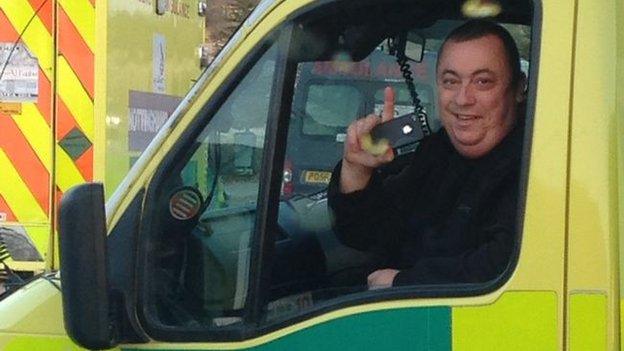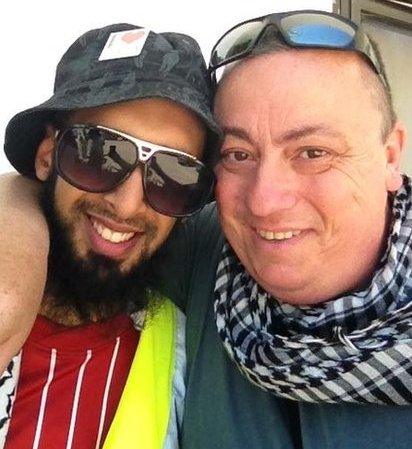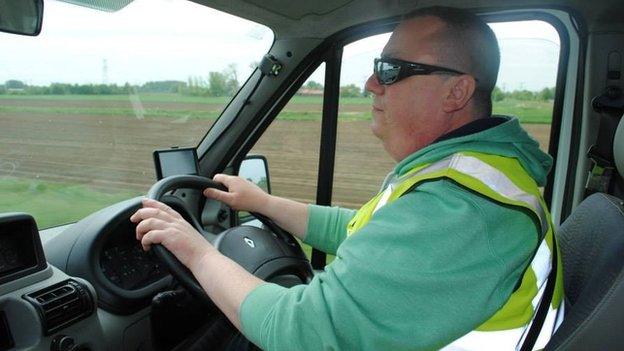Alan Henning: Syria trips were worthwhile, says hostage
- Published
In previously unseen footage, Mr Henning describes why he wanted to deliver aid to Syria
Video footage of British hostage Alan Henning - filmed before he was captured in Syria - has shown him describing his trips to the country as "worthwhile".
The 47-year-old was a volunteer on an aid convoy in December 2013 and was seized just after crossing into Syria.
A friend of Mr Henning from the convoy, who was with him when he was captured, has appealed to militant group Islamic State (IS) to release him.
Majid Freeman, of Leicester, urged the militants to "let him come home".
In the video, Mr Henning said: "It's all worthwhile when you see what is needed, as you get where it needs to go. That makes it all worthwhile.
"No sacrifice we do is nothing compared to what they are going through every day."
In a separate video posted on YouTube, a group representing British Muslim aid workers issued "a call of mercy" appealing for Mr Henning's release.

Mr Henning bought a generator to take to Syria for a hospital
The hostage, from Eccles in Greater Manchester, had been on two previous aid convoys to the region.
Mr Freeman, 26, said it was his "worst nightmare" to see his friend become a hostage when he had gone to Syria solely to help the Syrian people.
He said he was praying for Mr Henning's release and called on IS to show him "mercy and compassion" and "understand he's a humanitarian aid worker, he's not a fighter, he's not come there for political reasons".
"Please, please don't kill him. Please spare him. Just let him come back home," he said.
Passport inspected
Mr Henning, a father-of-two, had previously worked as a taxi driver. Mr Freeman said he was a "funny guy" known as "Gadget" or "Gadge" among the convoy members.
He was seized by militants shortly after crossing into Syria from the Turkish border.
Majid Freeman: "Please, please don't kill him. Please spare him. Just let him come back home"
The gunmen arrived at a compound where the convoy workers had stopped, and inspected their passports.
According to Mr Freeman, the gunmen said Mr Henning was a spy and took him away, because his passport had a chip inside - the standard biometric chip found in British passports.
The convoy members tried in the following days to explain that the chip is a standard feature of British passports, and that Mr Henning was an aid volunteer.
Their appeals were rejected.

Mr Freeman and Mr Henning formed a friendly bond during their time in the region
Mr Freeman said he made an extra effort to get to know Mr Henning, who was the only non-Muslim on the convoy.
Mr Freeman said Mr Henning had told him that he felt "at home" in the other aid workers' company.
"I remember at some point something broke down in our ambulance," Mr Freeman said. "The radio wasn't working properly. Immediately he volunteered himself and he fixed the radio.
"Gadget was out on a mission. He not only wanted to help the Syrian people, he wanted to help everyone in whatever way he could help."
Mr Freeman also said Mr Henning had slept in their vehicle when the convoy passed through Venice, rather than stay in a hotel, because he wanted to spend his money on the people of Syria.
Donated generator
Mr Freeman said Mr Henning once raised money for a hospital generator after seeing a news report on how babies had died because their hospital's electricity supply had been cut off.
"He actually started raising money and he bought a generator himself, and he took that generator to Syria.
"He knew he can't single-handedly save the whole of Syria and end this oppression. However, he thought even if he could help a few lives, even if he could save a few children, so the next time this happens in the hospital he wants them to have a generator.

Mr Henning fixed their ambulance when things went wrong
"That's the kind of person Gadget is."
Other members of the convoy said that while they liked listening to nasheeds - Islamic songs - on the convoys, Mr Henning enjoyed listening to Phil Collins, whose music he would play loudly in his ambulance.
Air strikes
Foreign Secretary Philip Hammond has said rescue options for Mr Henning were limited as his whereabouts were unknown.
A video showing the killing of British aid worker David Haines was recently published by IS. His death followed that of two US hostages who were also shown in videos.
IS is a radical Islamist group that has seized large swathes of territory in eastern Syria, and northern and western Iraq.
The US has launched a number of air strikes in recent weeks in an attempt to drive back its advance and support Iraqi and Kurdish forces fighting IS on the ground.
The UK has not been involved in the air strikes but has flown surveillance missions and supplied heavy machine guns and ammunition to the Iraqi army.